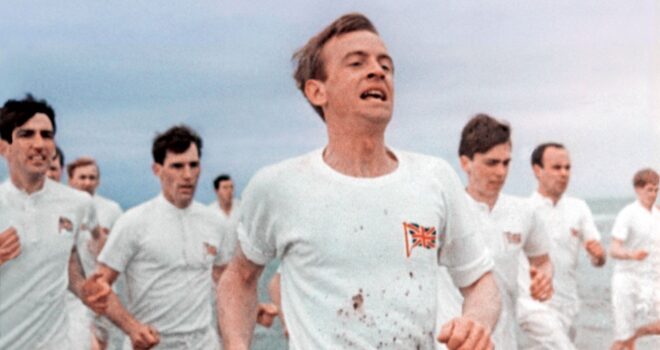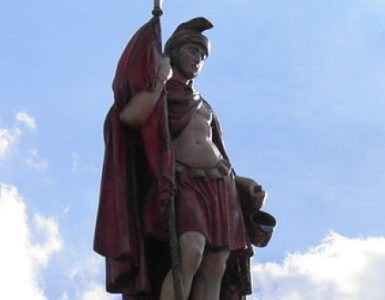Chariots of Fire is a film made by an unknown director with unknown lead actors, yet out of this team of unremarkables came one of Britain’s greatest and most inspirational films.
In 1947, British author Evelyn Waugh visited with a few film magnates in the United States to sell the film adaption of his novel Brideshead Revisited, his smash hit about Charles Ryder and his romance with the Flyte family. After Waugh dined his way from 5th Avenue to Sunset Boulevard with some of Hollywood’s biggest wigs, he decided to sail home without selling Brideshead’s rights to anyone. Why? Waugh sensed Hollywood had failed to grasp the theological dimension of his novel. In light of this blindness, Waugh happily dined and dashed back to England. America had fallen in love with Brideshead for the wrong reasons, and Waugh could not let the faulty romance continue.
Like Brideshead Revisited, many viewers watch Hugh Hudson’s Chariots of Fire and fall in love with the film for the wrong reasons. Some love the nostalgic veneer that Chariots’ first act takes towards the British Aristocracy. Like the aforementioned Brideshead Revisited, Chariots of Fire captures glints of the halogen glow that still surrounds the interwar period for most of the western imagination. An intoxicating cloud of aristocratic decadence floats through the film which is only enhanced by the knowledge that this movie is based on a true story. But even the fictional Lord Lindsey never seems to be without champagne, even going as far as to use it for hurdle training. There are sumptuous dinners, boat hats, and enough snatches of Gilbert and Sullivan to make any anglophile blush.
Others love Chariots’ truthful take on prejudice in the modern world. The two principal characters, Abrahams (a Jew) and Liddel (a non-Anglican Christian), encounter a power structure that, while explicitly welcomes them, implicitly excludes them at every turn. Some of the most powerful scenes take place between the masters Trinity College (John Gielgud) and Caius College (Lindsay Anderson) when they are making casual antisemitic comments behind closed doors. Abrahams, always aware of the prejudice surrounding him, devotes himself to “running them off their feet.” Chariots provides much to chew on about prejudice even four decades later.
Still others love Chariots of Fire as a classic sports film. With the backdrop of the 1924 Paris Olympics, each character strives for excellence in their field. The desire to “be the best” permeates each interaction. Of the three reasons to love this film mentioned thus far, the sports elements would seem to be the weakest as it does not follow the typical American sports film conventions. Yes, there is a montage. Yes, there is slow motion. Yes, a touching bond forms between Abrahams and his Coach Sam Mussabini (Ian Holm). Yet Hudson uses these elements and others to make a compelling sports story, but to say that Chariots of Fire is a sports film is to say Titanic is a nautical film. Is it wrong to love Chariots of Fire for any of these three reasons? No. But to stop at any of these themes is to miss what makes this film so excellent.
Chariots of Fire does have its detractors. The film does have flaws, but these gainsayers would have Chariots be another Rocky, Hoosiers, or Rudy. Anecdotally, those who dislike it typically find fault in the film’s pacing and cinematography, and the film is, admittedly, slow and muted to audiences accustomed to traditional sports films. There are long speeches, lots of slow motion, and the film sacrifices a typical screenwriting arc for a broader narrative. If Chariots of Fire were an American film, one can easily see Abrahams and Liddel squaring off for one final race for dominance. This, however, never happens.
As for Chariot’s more inert cinematography, Hugh Hudson comes from a similar school of 1960s British Commercial Directors as Ridley Scott, and there are several similar motifs in this film between the two directors. The most prominent of these is the almost unemotional composition of Hudson’s shots. The shots are always aesthetically interesting, but not in the same way that the preceding year’s best picture Raging Bull grabs your attention. The cinematography is subservient to the story. Likewise, the music, while fantastical and quintessentially 1981, is subservient to the story. Many key scenes have no music at all. Hugh Hudson and Vangelis don’t want to tell the audience what to feel in these moments or even how to feel. Rather, Hudson uses music as a leitmotif to expand on characters’ emotional states between scenes. Vangelis’ experience consisted mostly of commercials before this film which make this soundtrack and the soundtrack to Bladerunner two of the most unique and interesting movie scores in existence. Vangelis wrote the #1 billboard song that backs the famous “beach running” scene. Truly iconic.
The reason to love this film is not just for an iconic shot that happens within its first five minutes, but for its meditations on greatness in the context of human finitude. What is greatness? What is “being the best?” Is that why we exist on this planet? Let’s see some ways Hudson frames these questions.
The first way Hudson asks the viewer to consider these questions happens within the frame of time and its measurements. The plot itself only takes place over a handful of years (1919-1924), but the film begins and ends with Abrahams’ funeral (a lifetime). Early in the film, Abrahams’ breaks a record at Cambridge which has stood unbroken for 700 years (centuries). And while there is this sense of eternal glory which pervades the film, Abrahams is left with just ten seconds to ‘justify his existence’ by winning the 100-metre race. In the context of seven centuries, or even a lifetime, the events of the film become very small. And if the panoramic stretch of time was not enough to belittle the events of this film, the comparisons of human achievement make the film’s athletic achievements even smaller.
On the surface, this film asks Abrahams and Liddel why they run. Abrahams runs for himself—to prove his excellence in the face of those that would exclude him from the halls of power. Liddel runs for God, to give Him glory. When considering these answers, one might be led to take on an attitude of a pseudo-Christian nihilist. Is all this prowess for nothing? Abrahams must confront the emptiness of himself after winning the medal. Liddel preaches Isaiah 40 when he says, “the nations are a drop in the bucket,” on the Sunday he refuses to compete in honor of the Sabbath rest. In a way, this film proudly says that nothing matters in the context of the unstoppable march of time. Running matters very little compared to love or spreading the gospel.
But is this pseudo-Christian message the whole message? By no means! Every Catholic should watch this movie because it puts human achievement in the proper context. St. Irenaeus of Lyon writes “the glory of God is man fully alive!” and Eric Liddell echoes that sentiment when he says “I believe God made me for a purpose, but he also made me fast! And when I run I feel his pleasure.” There is supreme joy and beauty in simply living, and not only living, but living excellently.
Editor’s Note: This article is adapted from the author’s blog 100 Movies Every Catholic Should See.
Photo: Hudson, H. (Director). (1981). Chariots of Fire [Film]. 20th Century Fox and Allied Stars.










